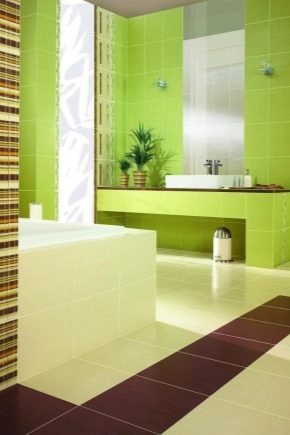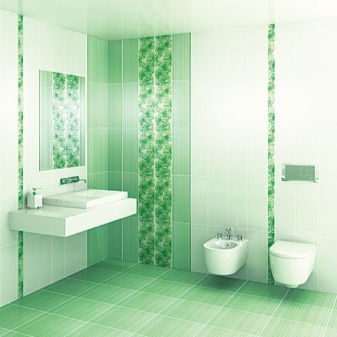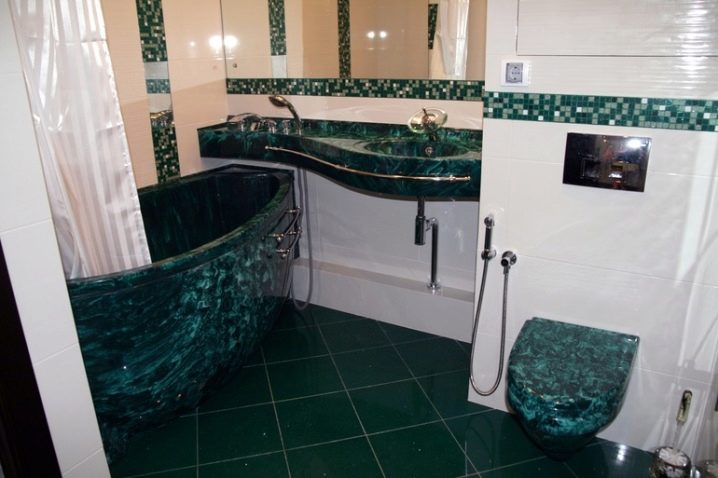How to choose green bathroom tiles?

For some people, the words "green bathroom tiles" can be a bit of a shock. The habit of blue, light, gray surfaces comes from a distant childhood. But it is worth stopping for a moment and summer landscapes appear in memory by themselves. Trees with emerald foliage fluttering in the wind, grass with dewdrops glistening in the sun, orchards filled with the scent of apples, olive groves. Such memories bring peace to the heart, the desire to slow down the rapid rhythm of the elusive days, to enjoy the freshness and comfort.

Peculiarities
Perhaps malachite boxes from the Ural fairy tales have come to your memory. Such associations are not accidental. Green is an integral part of a person's worldview, even a city locked in the stone jungle. It symbolizes rebirth, hope, calmness, has a beneficial effect on the nervous system, relieves irritation and prevents stress.
In the bathroom, a person meets every morning, comes here after work or study to wash off the fatigue and stress of the day. It is important that the design of this corner of the house suits its residents, so that they feel comfortable and confident here. Before making a final decision and choosing a green range product, you need to properly consider and feel it. After making sure that the composition corresponds to the inner perception of the world, does not irritate, gives rise to a desire to act, you can proceed to the choice of the material and size of the tiles.


Views
Materials (edit)
Products from ceramics and porcelain stoneware are the most popular type of finishing materials for the bathroom. It is durable, practical, resistant to high humidity, temperature changes, detergents.
- Enamel tiles more often used for finishing wall surfaces. It is made from pressed, pre-refined clay. Among the advantages are aesthetics, bright and rich color, ease of maintenance and resistance to cleaning agents. However, it creates glare and can irritate the eyes, negatively affecting health. Among other disadvantages, a short service life and fragility are distinguished.
- Matte (unglazed) the surface brings a feeling of warmth and comfort. Such a tile is obtained in the process of pressing and firing clay. It is rough and not slippery to the touch, and therefore it is more often used as a floor covering. It is not very easy to wash such a surface.


- Porcelain stoneware is used for finishing the floor. It is based on granite, which gives the coating a special appearance, increased strength and stability.
- Terracotta products have a pleasant and warm texture, they are made from unbaked clay, but not covered with glaze. Shades and textures depend on the time and process of production and firing. Today, such a product is made both by hand and in factories.
- Textured or decorative tiles looks original and unusual. It can imitate pebbles, air bubbles, metal, wood, cobwebs. In combination with matte or glossy materials, it turns the bathroom into a work of art.
So, ceramic products for floors and walls have different properties. Destination information is usually printed on the packaging. The wall cladding denotes the brush pattern, the floor cladding the foot pattern. A shaded foot indicates wear resistance. The “AA” mark means that the product has increased resistance to perfumery, cosmetics, chemicals and acids.



Dimensions (edit)
When choosing ceramic products, you need to pay attention to their thickness and dimensions. The standard thickness of the material for the floor is 8-11 cm, for the walls - 6-7 cm. Product dimensions vary depending on the operating conditions. There are several main types.
Mosaic and small tiles ranging in size from 1x1 cm to 10x10 cm used for finishing floor and wall surfaces. Both options are great for spacious rooms. With the help of decorative borders assembled from mosaics, you can decorate the bathroom and visually highlight certain areas, assemble panels.



The most widespread tiles are 20x20 cm or 20x30 cm. It looks beautiful in large and small rooms. The rectangular shape is interesting because it visually enlarges the space. The horizontal arrangement of the details makes the room wider, vertical - higher. When laid diagonally on the floor, it increases the floor area.
In a large bathroom, dimensional facing plates are used, they allow you to visually divide it into zones. However, sometimes products of different sizes are used in the same interior. This is how unusual geometric and color compositions appear, the space is modified.




Colors
In bathroom interior design, several variations of green are most often used.
- Emerald - a bright, radiant and at the same time calm and invigorating shade of the dark spectrum. So that the room does not seem too saturated, heavy, it is necessary to diversify the color scheme.



- Olive - calm, balanced and at the same time light and joyful, looks great with white and warm tones.



- Pistachio - soft, pleasant, spring. There is no obsession and aggressiveness in it. In combination with pale tones, it visually expands the space, and in combination with dark tones, it corrects its imperfections.


- Jade emphasizes rigor, elegance and sophistication.


- Malachite - a more intense, powerful shade, gives rise to a feeling of mystery, supernatural, freshness and elegance.

- Juicy greens - bright and refreshing; in combination with yellow it gives birth to lively and energetic compositions, with brown it brings a touch of nobility.



- Dead grass - looks great with yellow and white.


- Sea wave Is a very popular option. In combination with snow-white, it can give a feeling of emptiness, soreness and requires revitalizing details and inserts.

- Swamp brings calmness, balance and relaxation into the atmosphere. However, when developing a design, it should be borne in mind that a large amount of this shade will create a depressing and oppressive effect.

- Mustard gives warmth and comfort. It is important to combine it with other colors, otherwise there is a risk of getting a dark, gloomy and stuffy closet.

- Green apple - lively, refreshing, invigorating shade. Creamy reduces its saturation, soothes. In combination with snow-white, this tone visually enhances the space.


- Lime - juicy and dazzling color. Soothed by white and creamy tones, it creates a spring mood.
Light green and green-blue tiles are also popular. Such tiles can be used to decorate both walls and floors.

Style and design
A variety of colors, sizes of green tiles and excellent combinations with other colors allow you to use it to create a variety of styles in the bathroom.
- For the Greek style, take olive and white material. Enhance the decorative effect with brown designs.
- Olive cladding is perfect for a vintage style, while the floor is better laid out with sand-colored elements or real wood. The atmosphere of antiquity will be recreated by plumbing fixtures on carved legs.


- Pastel and turquoise tones will help fill the room with a nautical atmosphere. A vivid impression will be left by a mosaic depicting waves or lily flowers, for example.
- The combination of a shade of fresh greens, pistachio, sand will give the effect of a tropical forest.Live plants, brightly colored towels, wicker furniture will complement this impression.


- The combination of luscious greens, yellows, golds and light elements will allow you to decorate your bathroom in an Art Deco style. Jade and malachite tones are also good for him.
- Making one wall green and the other black or white demonstrates the courage and willingness to move forward, be the first and take risks. These are the characteristics of the avant-garde.
- Mosaic - the ideas of combining tiles of different colors are limited only by the designer's imagination. Colorful panels, patterns, skillfully placed accents will add charm and uniqueness to the bathroom.



Subtleties of choice
The richness of shades and textures of green tiles, a variety of ideas and design findings make it possible to create beautiful interiors.
To make them stylish and original, not only on the designer's layout, you should pay attention to some nuances.
- It is better to diversify a monochromatic canvas with other colors, shades or paintings.
- Light colors are more suitable for walls - they expand the space. Dark ones are for the floor.
- Furniture and accessories must match the chosen style.
- Snow-white plumbing looks beautiful in the green interior.
- Natural light enhances the depth of rich colors.
- The rich range of colors allows you to combine several styles in one space.
- Metal elements give the interior uniqueness and originality, however, you need to be very careful with them - there is a great risk that these details will not fit into the overall picture and destroy harmony.



Successful examples and options
Bathroom option for a man - a harmonious selection of shades, purity, nobility and elegance of the main color, vertical mosaic, laconicism. A red flower, a large chrome-plated faucet, metal inserts and a mirror attract attention and enliven the interior.

A small room is made in light, salad and olive colors. Unusual texture, brown blotches repeating on the curtain, leave a feeling of complete harmony. Light colors and a mirror visually expand the space.


The delicate turquoise hue of the walls, combined with white and sand, will give the freshness and lightness of the sea coast. A panel and a horizontal decorative border make the interior more lively. Golden handles on pieces of furniture also look great.

You will learn how to lay tiles in the bathroom in the next video.













The comment was sent successfully.